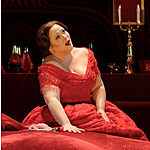In the introduction to the Oxford Classics edition of Alexandre Dumas’ “La Dame Aux Camélias” David Coward wrote: “No one could call it a particularly good book.” If true, then why would you bother to publish the book, and why would I bother to read it? Sadly, I have time on my hands and after slogging through; I can say that it is not a particularly good book.
Despite its questionable literary merits, Dumas quickly turned “Camélias” into a play, writing it in one week. Verdi attended the first performance in 1852, and by 1853 had composed “La Traviata,” an opera based on the book-cum-play (oh, grow up). Despite Mr. Coward’s and my opinion, the story of “La Dame Aux Camélias” has endured in various forms for over 150 years.
For their season opener, Opera Colorado unsurprisingly presents the operatic version of the story, “La Traviata.”
Much like real life, it is a tragedy, filled with death and a love that cannot be. The story centers on Violetta Valéry, a famed courtesan based on the real-life Alphonsine Plessis, who according to one description, had “the most beautiful teeth in the world.”
Alfredo Germont, a young man willing to do anything for her love and happiness, pursues Violetta to his detriment. His father asks that she leave Alfredo for the sake of his family. Since this is a tragedy, you can probably guess that she does, and then dies at a young age of tuberculosis.
You don’t need to have heard of “La Traviata” to recognize several of its songs. “Libiamo ne’ lieti calici” graces the soundtracks of classic films like “The Godfather” and “Rocky Balboa.” I’m also pretty sure that “È Strano!” played every time Peppé Le Pew fell in love. It is one of the most popular operas of all time and firmly lodged into the collective consciousness of the world, so it is no wonder Opera Colorado chose it to kick off their 25th season.
As the lead, Violetta is a difficult role, requiring a powerful soprano voice and massive amount of stage time. Pamela Armstrong sounded fantastic throughout, despite the amount of work. I checked this opinion with my date, who used to study opera, and she agreed. It is good to have validation from someone who truly knows what they are talking about.
The sets were lavish affairs, the first of which made me think “If I had any friends, I’ll bet I could throw a kick-ass party in that room.” My favorite was the one created for the country house in Act II. From the furniture, to the clothing, to the backdrop, almost everything was stark white. For all the sets, light direction played a large part in the beauty and feel of the scene, painting them with color or lack thereof.
The few noticeable problems could be chalked up to the fact that it was opening night. Garrett Sorenson’s (Alfredo) voice seemed to get louder as the performance progressed, someone stumbled on a dress, and what appeared to be a light gel fell from the rigging. I’m trying desperately to study so that I can sound intelligent and critical when writing these things, but so far the biggest mistake I can come up with, is shit falling from the ceiling. Maybe some day I’ll notice when someone when someone misses a cue or blows a note.
This was not my favorite opera, but it had nothing to do with the production. I recently watched an illegally downloaded video of another performance, and didn’t care for that either. From the outset the characters are constantly singing about how in love they are which just made me want to throw a bucket of ice water on them. What can I say? I’m a romantic.
Despite lack of interest in the story, the great thing about opera is that I could just sit back and enjoy the music. I am willing to admit that given the tremendous success of “La Traviata,” I could be off base. “Titanic” is the top-grossing film of all time, thematically similar, and to me, completely unbearable. However, like “Titanic,” my date cried at the end. In summary, if you enjoyed the movie “Titanic,” you will love “La Traviata.”

